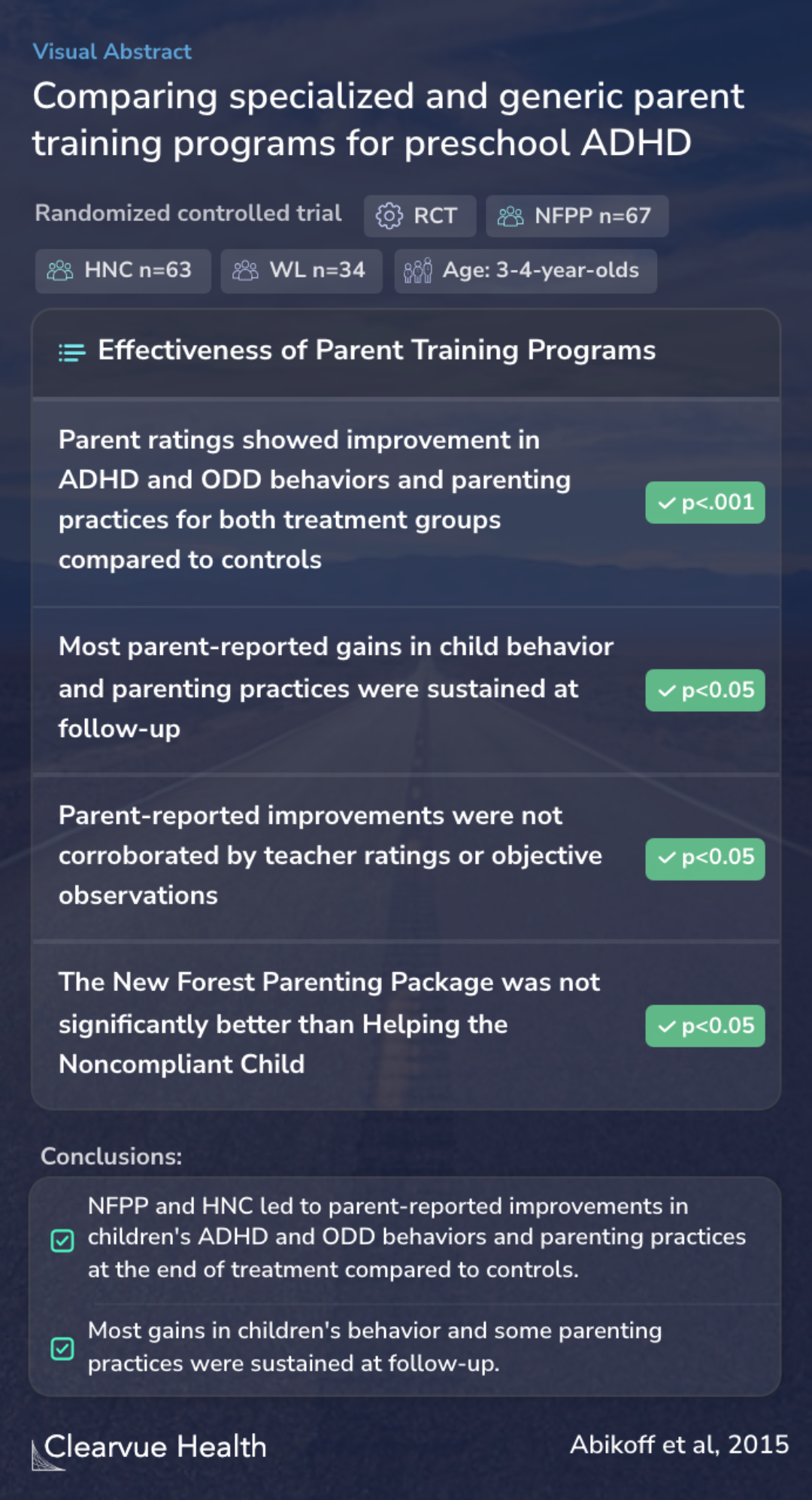Parent training for preschool ADHD: a randomized controlled trial of specialized and generic programs
Comparing specialized and generic parent training programs for preschool ADHD
Abikoff HB, Thompson M, Laver-Bradbury C, Long N, Forehand RL, Miller Brotman L, Klein RG, Reiss P, Huo L, Sonuga-Barke E

Objectives
The study focused on a special program called the 'New Forest Parenting Package' (NFPP) which is meant for parents of young kids showing signs of ADHD, a condition that makes it hard for them to pay attention and control their impulses. The NFPP is designed to help these parents in a way that improves these problems in their kids. The study aimed to check how well this program works, especially when compared to another well-known program for handling kids who don't listen well, called 'Helping the Noncompliant Child' (HNC). The researchers wanted to see which program does a better job in the short term and the long term, and if the improvements noticed at home also show up in other places, like school
The 'New Forest Parenting Package' (NFPP), an 8-week home-based intervention for parents of preschoolers with attention-deficit/hyperactivity disorder (ADHD), fosters constructive parenting to target ADHD-related dysfunctions in attention and impulse control. Although NFPP has improved p...
Methods
The researchers set up a study where 164 kids aged 3 to 4 years, who were diagnosed with ADHD, were split into three groups. One group of kids tried the NFPP, another group tried HNC, and a third group was put on a wait-list as a control to compare the results. After the treatments were done, the researchers checked on all the kids. They also did another check-up the following school year for the kids who went through NFPP and HNC. They looked at a bunch of different things to see if the programs were working, like how the kids behaved at school (according to their teachers who didn't know which program the kids were in), what their parents thought, and what the experts observed directly
A randomized controlled trial with three parallel arms was the design for this study. A total of 164 3-4-year-olds, 73.8% male, meeting DSM-IV ADHD diagnostic criteria were randomized to NFPP (N = 67), HNC (N = 63), or wait-list control (WL, N = 34). All participants were assessed at pos...
Results
Parent ratings indicated improvement in ADHD and oppositional defiant disorder (ODD) behaviors as well as parenting practices for both the NFPP and HNC treatment groups compared to the control group (p<.001). Most of these parent-reported gains in child behavior and parenting were maintained at follow-up (p<0.05). However, teacher ratings and objective observations did not confirm the parent-reported improvements (p<0.05).
Clinician ratings indicated that both treatment groups performed better than the waitlist control group (p<.001).
Elaborating on the physical aggression ratings, the data indicates that children in the HNC group were rated significantly better than the waitlist control (p=.004), while the NFPP group's improvement was not statistically significant (NS) compared to the control.
In summary, while parents reported improvements in both treatment groups, these gains were not corroborated by teacher ratings or objective measures. The NFPP was not significantly better than HNC and was less effective on a few outcomes, such as physical aggression ratings.
In both treatment groups, children's ADHD and ODD behaviors, as well as aspects of parenting, were rated improved by parents at the end of treatment compared to controls. Most of these gains in the children's behavior and in some parenting practices were sustained at follow-up. However, ...
Evidence Comparison
The study's results align with current evidence on ADHD treatment strategies. Behavioral therapy, involving parent training and educator support, is a crucial component of managing ADHD. The study found that both the New Forest Parenting Package (NFPP) and Helping the Noncompliant Child (HNC) led to parent-reported improvements in children's ADHD and oppositional defiant disorder (ODD) behaviors, as well as parenting practices. These findings reinforce the importance of behavioral interventions, particularly parent training, in treating preschool-aged children with ADHD.
Conclusions
The results do not support the claim that NFPP addresses putative dysfunctions underlying ADHD, bringing about generalized change in ADHD, and its underpinning self-regulatory processes. The findings support documented difficulties in achieving generalization across nontargeted settings, and the importance of using blinded measures to provide meaningful assessments of treatment effects.
The results do not support the claim that NFPP addresses putative dysfunctions underlying ADHD, bringing about generalized change in ADHD, and its underpinning self-regulatory processes. The findings support documented difficulties in achieving generalization across nontargeted settings,...
Key Takeaways
Context
A previous study highlighted this relationship, emphasizing the importance of addressing impulsivity to better comprehend ADHD in school-aged boys. The findings from this study suggest that interventions like NFPP, which target parental approaches to managing impulsivity, could be instrumental in mitigating ADHD symptoms.
Moreover, the relevance of skills training in improving the lives of individuals with ADHD is underscored by another study. It demonstrated the positive outcomes of a structured skills training program for adults with ADHD, pointing to the potential benefits of skill-based approaches in ADHD interventions. This further supports the premise of NFPP and similar programs that emphasize skill development, whether in children or their parents, as a pathway to better managing ADHD symptoms.